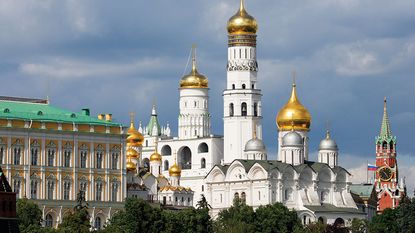The fallout from Europe’s energy crisis
The soaring price of gas could see the EU impose a cap on the price of electricity generated by nuclear and renewables, while signs of strain appear in the energy derivatives market, and investors are dumping European stocks.


Moscow’s “indefinite shutdown of Nord Stream 1”, Russia’s main gas connection to Germany, “was supposed to be the Kremlin’s big weapon that would send the wholesale price to new stratospheric levels”, say Ben Hall, Valentina Romei and Sam Fleming in the Financial Times. So far it hasn’t worked. Although they remain historically elevated, European wholesale gas and German electricity prices have instead fallen by 40% and 34% respectively since spiking late last month.
Russia’s share of EU gas imports has fallen from 40% to just 9% since the war began. With German storage tanks 88% full, “confidence is growing in…capitals that Europe can get through the winter without severe economic and social dislocation or energy rationing”.
The energy crisis is forcing a reform of Europe’s electricity market
On Wednesday European Commission president Ursula von der Leyen outlined sweeping plans to reform the continent’s electricity market. Gas is the marginal fuel for European power generation and thus drives electricity prices. This means non-gas electricity producers such as nuclear power and renewables can earn huge revenues while their production costs are now far below market prices. The plan is to cap these revenues, while she is also pushing for a windfall tax of 33% on the profits generated by energy companies.
Subscribe to MoneyWeek
Subscribe to MoneyWeek today and get your first six magazine issues absolutely FREE

Sign up to Money Morning
Don't miss the latest investment and personal finances news, market analysis, plus money-saving tips with our free twice-daily newsletter
Don't miss the latest investment and personal finances news, market analysis, plus money-saving tips with our free twice-daily newsletter
No wonder that governments want to raise revenue: “Added together, Europe and the United Kingdom have so far promised to spend more than €500bn ($500bn) to subsidise bills” in response to soaring prices, say Lauren Kent and Anna Cooban for CNN. The scale of the crisis means that proposals like a windfall tax that were considered “crazy in June” are now mainstream, Václav Bartuška, the Czech special envoy for energy security, told The Wall Street Journal.
Energy derivatives and European stocks are feeling the strain too
There are also signs of strain in the energy-derivatives market, says Gillian Tett in the Financial Times. European utility firms are facing crippling margin calls on contracts they had taken out to hedge against price falls. Soaring prices have created “massive paper losses” on these contracts, forcing some governments to step in. Up to €1.5trn may be needed as collateral, with the Finnish energy minister talking of “the energy sector’s version of [the] Lehman Brothers” meltdown. “Designing an electricity market is hard. The juice cannot yet be stored at scale, and has to be delivered at the exact moment it is needed,” says The Economist. European governments are trying to find a way to protect consumers while preserving the incentive for electricity producers to generate – and for consumers to lower the thermostat.
The energy furore is rattling investors further. European stocks have been slipping since mid-August amid fears of recession; last week the European Central Bank raised interest rates by three-quarters of a percentage point. “Bank of America’s monthly fund-manager survey showed global investors are the most underweight on European equities ever,” says Cormac Mullen on Bloomberg. The Euro Stoxx 600’s July lows may be “tested again soon”.

Alex is a member of the UK team at CVC Capital Partners. Prior to joining CVC, Alex worked in the London office of AEA Investors, a mid-market private equity firm. Previously he was part of the UK M&A team at Barclays Capital. Alex holds a BSc in economics from the University of Warwick.
-
-
 Number of ISA millionaires tops 4,000
Number of ISA millionaires tops 4,000The number of ISA millionaires has surged to more than 4,000 - what does it take to hit the seven-figure sum?
By Katie Binns Published
-
 NS&I August Premium Bonds draw - check from today
NS&I August Premium Bonds draw - check from todayNS&I bond investors can check from today to see if they scooped a prize in this month’s draw. With more than £404m to be handed out in prizes, find out what you won.
By Tom Higgins Published
-
 Investing in wine: how Cru Wine is reaching new audiences
Investing in wine: how Cru Wine is reaching new audiencesTips Gregory Swartberg, founder of fine wine specialist Cru Wine, talks to Chris Carter about how to start a wine collection
By Chris Carter Published
-
 Small companies with big potential
Small companies with big potentialMichael Taylor of Shifting Shares reviews his 2023 picks and highlights more promising minnows.
By Michael Taylor Published
-
 The MoneyWeek portfolio of investment trusts – July 2023 update
The MoneyWeek portfolio of investment trusts – July 2023 updateTips A decade ago we set up the MoneyWeek portfolio of investment trusts. They remain a compelling long-term bet says Rupert Hargreaves
By Rupert Hargreaves Published
-
 Women lead the way with ethical investments
Women lead the way with ethical investmentsDemand for more ethical investments has soared – and women are more likely to opt for them. Annabelle Williams, personal finance specialist at Nutmeg, takes a look at why.
By Annabelle Williams Published
-
 BoE: Mortgage payments to rise by £220 a month for households
BoE: Mortgage payments to rise by £220 a month for householdsMillions of households can expect a mortgage spike of around £200 a month - and some may even reach a extra £1,000 a month, the Bank of England warns
By Marc Shoffman Published
-
 What happened to Thames Water?
What happened to Thames Water?Thames Water, the UK’s biggest water company could go under due to mismanagement and debt. We look into how the company got itself into this position, and what investors should expect.
By Simon Wilson Last updated
-
 Where to invest in the metals that will engineer the energy transition
Where to invest in the metals that will engineer the energy transitionA professional investor tells us where he’d put his money. This week: John Ciampaglia, manager of the Sprott Energy Transition Materials UCITS ETF.
By Nicole García Mérida Published
-
 How investors can profit from high food prices
How investors can profit from high food pricesThe latest furore over grocery prices will die down, says David Stevenson. But the long-term outlook for soft commodities remains bullish. These are the stocks investors can buy to profit from high food prices.
By David J Stevenson Published









